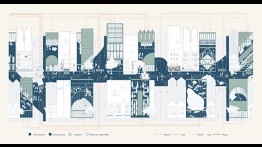Architectures of Transition | Neeraj Bhatia: Forming Life In Common
Thursday, January 26, 2023, 6:30 - 8:30pm

Decentering the Commune, The Center Won’t Hold, Chicago Architecture Biennial 2021. Image: THE OPEN WORKSHOP
This lecture will be conducted through Zoom only.
For Zoom attendance, please register in advance here.
Commoning is the act of sharing and managing resources—cultural and natural—with minimal reliance on the market or state, and where each stakeholder has an equal interest. User-managed governance of the environments we inhabit—from land ownership, to buildings, to domestic spaces—enables residents to be key agents in how resources are distributed, valued, and maintained.The expansion of the noun ‘common’ to the verb ‘commoning’ entails the active participation in the mechanisms of sharing, including the shaping of rules that sustain the commons and exploring the emancipating potentials of sharing. As such, commoning is a practice that is continually evolving, made and remade by the subjects involved in the commons. Through an ongoing process of working together, negotiating, and organizing, these practices produce what is to be named, valued, used, and symbolized in common. Ultimately, these practices create forms of social life—highlighting new forms of living, working, and being in common. This lecture will focus on a series of design experiments by THE OPEN WORKSHOP that explore a range of commons—both in type and scale—that use architecture to catalyze and frame the mechanisms for commoning.
The presentation will be followed by a discussion moderated by Elisa Iturbe.
NEERAJ BHATIA is an architect and educator whose work resides at the intersection of politics and architecture. Neeraj is founder of THE OPEN WORKSHOP, a transcalar design-research office examining the negotiation between architecture, territory, and collectivity. Based in San Francisco, THE OPEN WORKSHOP is a licensed practice in California and Ontario. Their work on Collective Form has been commissioned by the Seoul Biennale, Venice Biennale, Chicago Architecture Biennial, and the Yerba Buena Center for the Arts, amongst other venues. Select distinctions include the Architectural League Young Architects Prize, Emerging Leaders Award from Design Intelligence, and the Canadian Prix de Rome. Neeraj is an Associate Professor at the California College of the Arts where he also Directs the urbanism research lab, the Urban Works Agency. Bhatia has also held teaching positions at UC Berkeley (as the visiting Esherick Professor), UT Arlington, Cornell University, Rice University (Wortham Fellow), and the University of Toronto. He is co-editor of books Bracket [Takes Action], The Petropolis of Tomorrow, Bracket [Goes Soft], Arium: Weather + Architecture, and co-author of Pamphlet Architecture 30: Coupling — Strategies for Infrastructural Opportunism and New Investigations in Collective Form.
Elisa Iturbe is Assistant Professor at the Cooper Union. Her research is currently focused on the relationship between energy, power, and form and her writings have been published in AA Files, Log, Perspecta, Antagonismos, New York Review of Architecture, and more. Iturbe is also co-founder of Outside Development, a design and research practice.
This event is free and open to the public through Zoom.
Located at 7 East 7th Street, between Third and Fourth Avenues




